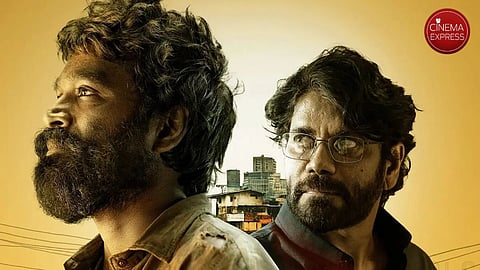Kuberaa Movie Review: A searingly humane socio-political thriller
Kuberaa(3.5 / 5)
On the surface, Sekhar Kammula’s Kuberaa is a quintessential David vs Goliath story, it speaks about inequality and class divide set against a world of high-end socio-political corruption where the poor are ruthlessly used as pawns. However, the evil of inequality permeates even the boundaries between life and death in this world. In a scene early on, a beggar is denied dignity during his cremation. This moment completes a circle in the second half as our protagonist Deva (Dhanush) moves mountains to lend dignity to the death of someone like him, even as he learns the price that needs to be paid for it. Kuberaa works best when, amidst its frantic storytelling, it prioritises emotional intensity over pace.
Director: Sekhar Kammula
Cast: Dhanush, Nagarjuna, Rashmika Mandanna, Jim Sarbh, Dalip Tahil
Paced at a breakneck speed, Kuberaa sprints throughout its 3-hour runtime, which is an accomplishment in itself. However, in the process, it ends up barely leaving room for emotional heft, especially in the first half. Every scene comes close to being hurried, some of them toppling over the line. There is no breather here — the narrative keeps you at the edge of your seat, even discomfortingly so at times. You want the moments to stay longer and hit you harder, but Kuberaa has lofty ambitions. It wants to tug at your heartstrings while also punching you in the gut.
Nagarjuna plays Deepak, a once-reputed CBI officer who chooses to cross over to the other side of the law after facing years of injustice and yet is consistently reflecting upon his choices. There is almost a mythological arc to Deepak’s journey, about why he chooses to change gears, but this segment of the film is strangely brief and rushed. Such a sense of emotional distance appears throughout the film. At one point, after learning of something dastardly and inhumane, Deepak goes home just to ensure that his family is in a state of peace, away from the violence he has become a part of. It’s a gutting moment, and it is during these moments that you wonder whether Kuberaa would have served better as a long-form series, spending more time exploring its characters’ morality and the gritty universe it builds up so well.
However, the frantic pacing of Kuberaa begins to make increasingly more sense once you put yourself in the shoes of Deva (Dhanush), a man picked up from the lowest rung of hell, only to be told that the world is going to end sooner than anyone can fathom.
There is a lot of ambition at play here, and no spoon-feeding. Sekhar Kammula incorporates quick flash cuts of Deva’s past to help us make sense of his trauma. The use of black-and-white occurs at the most unexpected juncture. The director even makes space for the backstories of Deva’s friends. They might not seem consequential in the larger scheme, but Sekhar gives them screen space amidst such a chaotic narrative because these marginalised underdogs are what the film is about.
It’s fitting that in such a high-stakes narrative, Sameera’s character (Rashmika Mandanna), who also works as an occasional comic relief, stands to represent the apolitical and apathetic middle-class who seemingly have no skin in the game but gradually learn to take a stand. It’s also impressive how Sameera’s story is intertwined in the broader story arc without deviating from the core or taking away from the film’s tense atmosphere. Kuberaa is also a rare film for present times that incorporates religious faith in a way that is personal and not political. Deva might not know much about the world, but he knows to believe in God. This belief is what drives Deva to push himself into territories far beyond his realm or capacity, making him the moral backbone of the story.
All of these complex ambitions fall under the larger umbrella of the angsty idealism of its director. The film’s moral stand often keep sneaking in, in the form of verboten commentary which dampens the impact a little — but Sekhar Kammula is a filmmaker who wears his heart on the sleeve. Kuberaa presents to us a complex world, showcasing many facets of morality, but it’s also clear about where it stands on who the antagonists and protagonists are. There are no moral ambiguities — It’s a quintessential Sekhar Kammula movie in that sense.
At one point, Deva, our protagonist, is compared to a cockroach. He is also someone who remembers like an elephant and relates to dogs, creatures who belong to the streets like him, and Dhanush brings a primal energy to the part in spellbinding measures, lending it a vulnerability very few actors can. He holds the film together through its weak segments. When we don’t see Deva, things appear slightly amiss. More importantly, Dhanush’s unbridled abandon is in perfect sync with Sekhar’s go-for-broke earnestness.
I had already mentioned how the film's hectic pacing occasionally feels like a deterrent in its own path — except for one moment where Deva, escaping the wrath of a few evil men, eats a nibble of food before he jumps in the sea to save his skin. For people like Deva, every moment of life is about survival, and Dhanush’s performance, aided by Sekhar’s direction, does wonders here. I burst into tears. If it was any other movie, I would have wept for a little longer — but Kuberaa wants us to run along and keep up, even as it tenderly wipes tears off our face. It's hard not to be overwhelmed by the sheer ambition on display here, and Kuberaa is a bold stroke of filmmaking, staunch in its commentary and so affecting in its sentiment. A few quibbles can be ignored.

